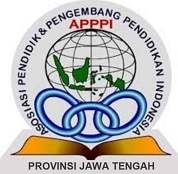Pemahaman Aspek Testing Models dan Purpose of Models Siswa Peminatan MIPA SMA Negeri Se- Kabupaten Brebes
Abstract
Keywords
Full Text:
PDFReferences
Arikunto, S. (2009). Dasar-dasar evaluasi pendidikan. Jakarta: Bumi Aksara.
Cheng, M.-F., & Lin, J.-L. (2015). Investigating the Relationship between Students’ Views of Scientific Models and Their Development of Models. International Journal of Science Education, 37(15), 2453–2475. https://doi.org/10.1080/09500693.2015.1082671.
Giere, R. (2006). Scientiï¬c Perspectivism. Chicago, IL: University of Chicago Press.
Gilbert, J. K., Boulter, C. and Rutherford, M. (1998). Models in explanations, Part 1: Horses for Courses. International Journal of Science Education, 20, 83–97.
Gilbert, J. K. and Reiner, M. (2000). Thought experiments in science education: potential and current realisation. International Journal of Science Education, 22, 265–283.
Justi, R., and J. Gilbert. (2002). Science Teachers’ Knowledge About and Attitudes Towards the Use of Models and Modelling in Learning Science. International Journal of Science Education, 24: 1273–1292.
Justi, R., and J. Gilbert. (2003). Teachers’ Views on the Nature of models. International Journal of Science Education, 25: 1369–1386.
Khan, S. (2011). What’s Missing in Model-based Teaching. Journal of Science Teacher Education, 22:535–560.
Mukhadis, Amat. (2013). Sosok Manusia Indonesia Unggul dan Berkarakter dalam Bidang Teknologi Sebagai Tuntutan Hidup di Era Globalisasi.
Nersessian, N. (1984). Faraday to Einstein: Constructing Meaning in Scientific Theories. Dordrecht: Matinus Nijhoff.
Oh, P. S., & Oh, S. J. (2011). What teachers of science need to know about models. An overview. International Journal of Science Education, 33(8), 1109–1130. https://doi.org/10.1080/09500693.2010.502191.
Sugiyono. (2015). Metode Penelitian Kombinasi (Mix Methods). Bandung: Alfabeta.
Svoboda, J., and C. Passmore. (2013). The Strategies of Modeling in Biology Education. Science & Education, 22: 119–142.
Venville, G., & Donovan, J. 2008. How pupils use a model for abstract concepts in genetics. Journal of Biological Education, 43(1), 6–14. https://doi.org/10.1080/00219266.2008.9656143.
Wellington, J. (1998). Practical work in science: time for a reappraisal. In J. Wellington (ed.), Practical Work in School Science: Which Way Now? (London: Routledge), 3–15.
Wijaya, E. Y, Sudijimat, D. A., & Nyoto, A. (2016). Transformasi Pendidikan Abad 21 Sebagai Tuntutan Pengembangan Sumber Daya Manusia Di Era Global. Prosiding Seminar Nasional Pendidikan Matematika 2016, Universitas Negeri Malang.
Zangori, L., & Forbes, C. T. (2016). Development of an Empirically Based Learning Performances Framework for Third-Grade Students’ Model-Based Explanations About Plant Processes. Science Education, 100(6), 961–982. https://doi.org/10.1002/sce.21238.
DOI: https://doi.org/10.26877/mpp.v15i2.10129
Refbacks
- There are currently no refbacks.

This work is licensed under a Creative Commons Attribution-ShareAlike 4.0 International License.








